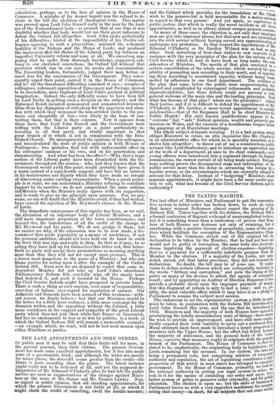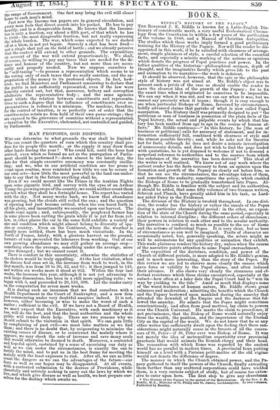THE TAXING MACHINE.
THE last effort of Ministers and Parliament to put the representa- tive system in better order has broken down, to such an extent that many earnest Reformers almost regret the passing of the Bribery Bill. Taken together with the debates, the Bribery Bill is a formal confession of flagrant evils and of unaccomplished redress; but it is something worse than a confession—it proves that Mem- bers of both Houses are desirous not only of retaining, but of sanctioning with a positive licence of perpetuity, some of the prac- tices which facilitate the corruption of the Representative Cham- ber. While the Commons struck out of the original bill the declaration to be taken by the Member, that he had not been and would not be guilty of corruption, the same body also inserted a clause legalizing the payment of election-expenses—legalizing, that is, a payment for a sufficiently indefinite purpose from the Member to the electors. If a majority of the Lords, not mire sisted, struck out that latter provision, they did not reinsert the declaration. No doubt, the bill may be of some use. It endea- yours to define certain offences which are colloquially included in the words " bribery and corruption," and puts the stamp of ilk, gality on many of the devices to which the agents of corruption resort; and by appointing an Auditor of Election Expenses it does provide a probable check upon the improper payment of money. But this fragment of reform is only to last a year; and so, Pe' sibly, the most valuable effect which it may have is as a pledge to Parliament to resume the subject next session. The endeavour to set the representative system a little in order must be taken in conjunction with the Reform Bill introduced by Lord John Russell this year, and the one that he introduced In 180. Ministers and the majority of both Houses have agreedm proclaiming the totally unsatisfactory state of things—have shown the wish to provide an improvement, and have still more empha- tically exposed their total inability to carry out a professed duty. Many attempts have been made to introduce a larger proportion of measures into the Upper House; but the effort has failed, because the majority of statesmen, and the general body of the Lower House, conceive that measures ought to originate with the Prat branch of the Parliament. The House of Commons is thus de- dared to be, emphatically, the originating body in legislation; the Lords remaining but the revisers. In our system, the laws not being a permanent code, but comprising matters of temporal' authority and regulation, the sot of legislating constitutes a large proportion of that which in most states has belonged to exectitlYe government. To the House of Commons, primarily, we look for we
the national authority in setting our legal system
look to it for the means of extending our army and navy, 0,T,!. better system of police to preserve order internally, and for pot education. The cholera is upon us ; but the state of business Parliament leaves us with a very imperfect machinery for counr.
to order ;.
acting that enemy—in short, for all subjects that can come volll'
the range of Government. One fact may bring the evil still closer home to each man's mind.
Just now the Income-tax papers are in general circulation, and every man feels that direct search into his pocket. He has to pay heavily,
and in a disagreeable form. He knows that the Income- tax is only a fraction, say about a fifth part, of that which he has to yield—the most disagreable fraction, but not really expressing the whole burden. The war, which some expected to see dashed off at a blow, is not yet begun. Scarcely a shot has been fired— not a single shot yet on the field of battle ; and we already perceive that the contest will extend to other grounds. The expenditure on account of the war will extend proportionately. We shall, of course, be willing to pay any taxes that are needed for the de- fence and honour of the country, but not more than are neces- sarily and properly needed. ow we suppose ourselves to be "self-taxing "—to possess a representation which seems to us the voting only of such taxes that we really sanction, and the ap- propriation of the money to its professed objects. In fact, how- ever, we find Ministers and Parliament concurring to declare that the public is not sufficiently represented, even if the law were honestly carried out, but that, moreover, bribery and corruption adulterate the representative body ; and the same agencies must vitiate the relation between constituents and representa- tives to such a degree that the influence of constituents over re- presentatives is reduced to a minimum. The machine, therefore, for the control of taxation, is so perfectly out of order that the constituencies retain no firm hold of their own purse-strings ; they are exposed to the grievance of countries without a representation —taxation by the Executive, obstructed, not controlled and guided, by Parliament.



























 Previous page
Previous page